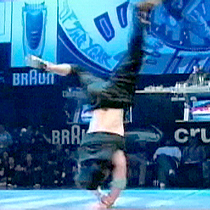-
(单词翻译:双击或拖选)
New York City
19 July 2007
A new documentary by director Benson Lee, Planet B-Boy, is about a dance form called b-boying, or break dancing. Invented on the streets of New York in the early 1970s by black and Latino youths, it’s become a global phenomenon. And since 1990, champion teams from around the world have met and competed annually2 at an international championship started by German enthusiasts4.
 |
| The 2005 “Battle of the Year” included top b-boy crews from more than 20 countries |
The film shows how b-boying developed more than 30 years ago as part of the urban culture of hip3 hop5 music. An early b-boy who goes by the name Trac2 explained it to the filmmakers, saying, "B-boy comes from the terminology6 'beat boy,' because we dance to the specific beat of a record. It's a gesture of a fight, without actually touching7 someone, but with the same intensity8 of a battle of a gang."
As the film shows, the 1983 Hollywood movie Flashdance took break dancing outside the U.S. for the first time. In the years since, it has moved into almost every corner of the planet. Planet B-Boy director Benson Lee said that in the last decade, Internet video sites have also spread the dance to new generations.
"They learn by watching and observing and playing back these videos in slow motion, and emulating9 the moves, and that's basically how a lot of b-boys are born, actually,” he said in an interview.
 |
| Filmmaker Benson Lee directed Planet B-Boy |
In recent years, breakers have begun to choreograph11 some of their performances. An MTV-like video from Planet B-Boy shows b-boys dressed as North and South Korean soldiers dancing together along the demilitarized zone between the two countries. They are a South Korean crew called the Drifterz.
But b-boying is rooted in improvisation12, especially in "battles," where opposing crews try to outdo each other on the spot. Benson Lee says that the competition actually brings people together. "It's not just like, 'We are the world, and let's hold hands across the globe,’” he said. “It really is, 'Let's come together, and show each other what we've got. Let's compare and compete, and actually further our own skill level by exchange.' And a lot of people misinterpret that as aggression13, as violent -- because they don't understand the vocabulary, perhaps."
 收听单词发音
收听单词发音
1
weaver

|
|
| n.织布工;编织者 | |
参考例句: |
|
|
|
2
annually

|
|
| adv.一年一次,每年 | |
参考例句: |
|
|
|
3
hip

|
|
| n.臀部,髋;屋脊 | |
参考例句: |
|
|
|
4
enthusiasts

|
|
| n.热心人,热衷者( enthusiast的名词复数 ) | |
参考例句: |
|
|
|
5
hop

|
|
| n.单脚跳,跳跃;vi.单脚跳,跳跃;着手做某事;vt.跳跃,跃过 | |
参考例句: |
|
|
|
6
terminology

|
|
| n.术语;专有名词 | |
参考例句: |
|
|
|
7
touching

|
|
| adj.动人的,使人感伤的 | |
参考例句: |
|
|
|
8
intensity

|
|
| n.强烈,剧烈;强度;烈度 | |
参考例句: |
|
|
|
9
emulating

|
|
| v.与…竞争( emulate的现在分词 );努力赶上;计算机程序等仿真;模仿 | |
参考例句: |
|
|
|
10
condemns

|
|
| v.(通常因道义上的原因而)谴责( condemn的第三人称单数 );宣判;宣布…不能使用;迫使…陷于不幸的境地 | |
参考例句: |
|
|
|
11
choreograph

|
|
| v.设计舞蹈动作 | |
参考例句: |
|
|
|
12
improvisation

|
|
| n.即席演奏(或演唱);即兴创作 | |
参考例句: |
|
|
|
13
aggression

|
|
| n.进攻,侵略,侵犯,侵害 | |
参考例句: |
|
|
|















